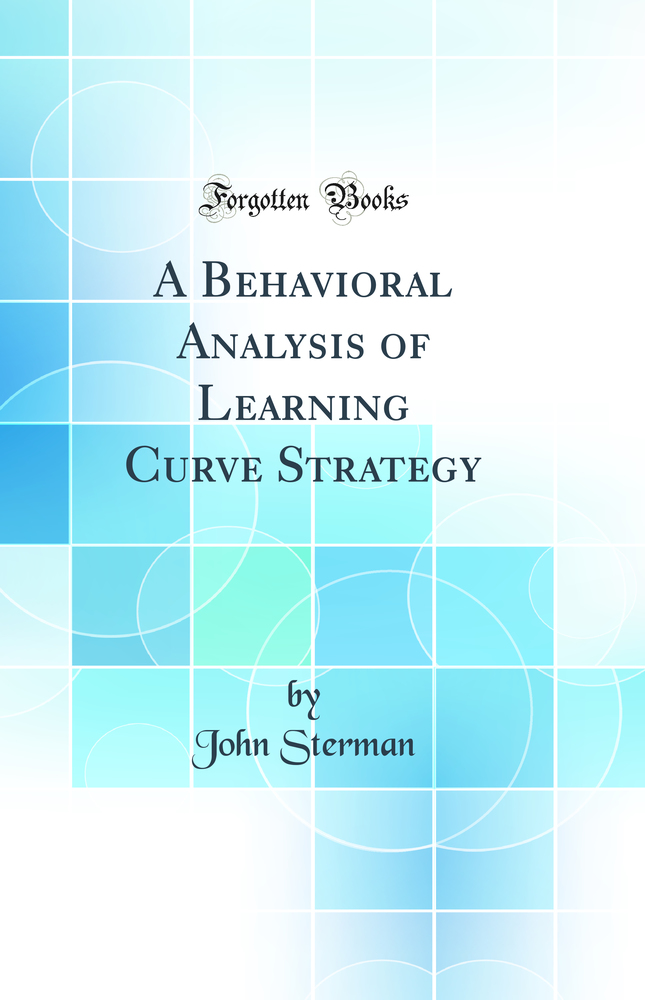Description
Excerpt from A Behavioral Analysis of Learning Curve Strategy
In this paper we show that relaxing the assumptions of instantaneous market clearing and perfect foresight leads, in a variety of plausible circumstances, to competitive dynamics significantly different from those predicted by much of the existing literature. We begin with a review of the literature on strategy in the presence of learning curves. We then develop a model in which the assumptions of market clearing and rationality are replaced by a disequilibrium, behavioral framework in which firms face lags in adjusting capacity and use boundedly rational decision heuristics to set prices and forecast demand. We use the model to explore the impact of an aggressive leaming-curve strategy in a variety of environments.
When the dynamics of the market are sufficiently slow, delays in information acquisition, decision making, and system response are sufficiently short, and the cognitive demands on the firms are sufficiently low, behavioral theory yields predictions observationally indistinguishable from those of equilibrium models. However in more dynamic environments, in which boundedly rational forecasting techniques become less accurate, the aggressive learning curve strategies prescribed in the game theory literature become inferior, as aggressive expansion leads to excess capacity. We close with implications for the study of strategic competition in general, arguing that the neoclassical assumptions of equilibrium and rationality may in many realistic circumstances prove to be a dangerous guide to action and a weak basis for empirical research.
About the Publisher
Forgotten Books publishes hundreds of thousands of rare and classic books. Find more at www.forgottenbooks.com
This book is a reproduction of an important historical work. Forgotten Books uses state-of-the-art technology to digitally reconstruct the work, preserving the original format whilst repairing imperfections present in the aged copy. In rare cases, an imperfection in the original, such as a blemish or missing page, may be replicated in our edition. We do, however, repair the vast majority of imperfections successfully; any imperfections that remain are intentionally left to preserve the state of such historical works.
In this paper we show that relaxing the assumptions of instantaneous market clearing and perfect foresight leads, in a variety of plausible circumstances, to competitive dynamics significantly different from those predicted by much of the existing literature. We begin with a review of the literature on strategy in the presence of learning curves. We then develop a model in which the assumptions of market clearing and rationality are replaced by a disequilibrium, behavioral framework in which firms face lags in adjusting capacity and use boundedly rational decision heuristics to set prices and forecast demand. We use the model to explore the impact of an aggressive leaming-curve strategy in a variety of environments.
When the dynamics of the market are sufficiently slow, delays in information acquisition, decision making, and system response are sufficiently short, and the cognitive demands on the firms are sufficiently low, behavioral theory yields predictions observationally indistinguishable from those of equilibrium models. However in more dynamic environments, in which boundedly rational forecasting techniques become less accurate, the aggressive learning curve strategies prescribed in the game theory literature become inferior, as aggressive expansion leads to excess capacity. We close with implications for the study of strategic competition in general, arguing that the neoclassical assumptions of equilibrium and rationality may in many realistic circumstances prove to be a dangerous guide to action and a weak basis for empirical research.
About the Publisher
Forgotten Books publishes hundreds of thousands of rare and classic books. Find more at www.forgottenbooks.com
This book is a reproduction of an important historical work. Forgotten Books uses state-of-the-art technology to digitally reconstruct the work, preserving the original format whilst repairing imperfections present in the aged copy. In rare cases, an imperfection in the original, such as a blemish or missing page, may be replicated in our edition. We do, however, repair the vast majority of imperfections successfully; any imperfections that remain are intentionally left to preserve the state of such historical works.
Details
Publisher - Forgotten Books
Language - English
Hardback
Contributors
Author
John Sterman
Published Date -
ISBN - 9780484524995
Dimensions - 22.9 x 15.2 x 0.2 cm
Page Count - 39
Paperback
Contributors
Author
John Sterman
Published Date -
ISBN - 9781334298356
Dimensions - 22.9 x 15.2 x 0.2 cm
Page Count - 41
Payment & Security
Your payment information is processed securely. We do not store credit card details nor have access to your credit card information.

